- Home
- Jojo Moyes
Me Before You Page 29
Me Before You Read online
Page 29
said ‘family issues’ – but she was a busy little thing. When she wasn’t looking after Will, she was dashing around, cleaning and washing, whizzing backwards and forwards to the travel agent’s and to the library. I would have known her anywhere in town because she was so conspicuous. She wore the brightest-coloured clothing of anyone I’d seen outside the tropics – little jewel-hued dresses and strange-looking shoes.
I would have said to Camilla that she brightened the place up. But I couldn’t make that sort of remark to Camilla any more.
Will had apparently told her that she could use his computer, but she refused, in favour of using those at the library. I don’t know if she was afraid of being seen to be taking advantage, or if it was because she didn’t want him to see whatever it was that she was doing.
Whichever it was, Will seemed a little happier when she was around. A couple of times I heard their conversations filtering through my open window, and I’m sure I heard Will laugh. I spoke to Bernard Clark, just to make sure he was quite happy with the arrangement, and he said it was a bit tricky as she had split up with her long-term boyfriend, and all sorts of things seemed to be up in the air at their home. He also mentioned that she had applied for some conversion course to continue her education. I decided not to tell Camilla about that one. I didn’t want her to think what that might mean. Will said she was into fashion and that sort of thing. She was certainly easy on the eye, and had a lovely figure – but, honestly, I wasn’t sure who on earth would buy the kinds of things she wore.
On Monday evening, she asked if Camilla and I would come with Nathan into the annexe. She had laid out the table with brochures, printed timetables, insurance documents and other things that she’d printed off the internet. There were copies for each of us, in clear plastic folders. It was all terribly organized.
She wanted, she said, to present us with her plans for a holiday. (She had warned Camilla that she would make it sound like she was the one gleaning all the benefit, but I could still see Camilla’s eyes grow a little steely as she detailed all the things she had booked for them.)
It was an extraordinary trip that seemed to involve all sorts of unusual activities, things I couldn’t imagine Will doing even before his accident. But every time she mentioned something – white-water rafting, or bungee jumping or what have you – she would hold up a document in front of Will, showing other injured young men taking part, and say, ‘If I’m going to try all these things you keep saying I should, then you have to do them with me.’
I have to admit, I was secretly rather impressed by her. She was a resourceful little thing.
Will listened to her, and I could see him reading the documents she laid out in front of him.
‘Where did you find all this information?’ he said, finally.
She raised her eyebrows at him. ‘Knowledge is power, Will,’ she said.
And my son smiled, as if she had said something particularly clever.
‘So … ’ Louisa said, when all the questions had been asked. ‘We will be leaving in eight days’ time. Are you happy, Mrs Traynor?’ There was a faint air of defiance in the way she said it, as if she were daring Camilla to say no.
‘If that’s what you all want to do, then it’s quite all right by me,’ Camilla said.
‘Nathan? Are you still up for it?’
‘You bet.’
‘And … Will?’
We all looked at him. There was a time, not that long ago, when any one of these activities would have been unthinkable. There was a time when Will would have taken pleasure in saying no just to upset his mother. He had always been like that, our son – quite capable of doing the opposite of what was right, simply because he didn’t want to be seen to be complying, in some way. I don’t know where it came from, this urge to subvert. Perhaps it was what made him such a brilliant negotiator.
He looked up at me, his eyes unreadable, and I felt my jaw tense. And then he looked at the girl, and smiled.
‘Why not?’ he said. ‘I’m quite looking forward to seeing Clark throw herself into some rapids.’
The girl seemed to physically deflate a little – with relief – as if she had half expected him to say no.
It’s funny – I admit, when she first wound her way into our lives I was a little suspicious of her. Will, despite all his bluster, had been vulnerable. I was a little afraid that he could be manipulated. He’s a wealthy young man, despite it all, and that wretched Alicia running off with his friend had made him feel about as worthless as anyone in his position could feel.
But I saw the way Louisa looked at him then, a strange mixture of pride and gratitude on her face, and I was suddenly immensely glad that she was there. My son, although we never said as much, was in the most untenable of situations. Whatever it was she was doing, it seemed to be giving him just a small respite from that.
There was, for a few days, a faint but definitely celebratory air in the house. Camilla wore an air of quiet hopefulness, although she refused to admit to me that that was what it was. I knew her subtext: what did we really have to celebrate, when all was said and done? I heard her on the telephone to Georgina late at night, justifying what she had agreed to. Her mother’s daughter, Georgina, she was already looking for any way in which Louisa might have used Will’s situation to advantage herself.
‘She offered to pay for herself, Georgina,’ Camilla said. And, ‘No, darling. I don’t really think we have a choice. We have very little time and Will has agreed to it, so I’m just going to hope for the best. I think you really have to do the same now.’
I knew what it cost her to defend Louisa, to even be nice to her. But she tolerated that girl because she knew, as I did, that Louisa was our only chance of keeping our son even halfway happy.
Louisa Clark had become, although neither of us said it, our only chance of keeping him alive.
I went for a drink with Della last night. Camilla was visiting her sister, so we went for a walk down by the river on the way back.
‘Will’s going to take a holiday,’ I said.
‘How wonderful,’ she replied.
Poor Della. I could see her fighting her instinctive urge to ask me about our future – to consider how this unexpected development might affect it – but I didn’t suppose she ever would. Not until this was all resolved.
We walked, watching the swans, smiling at the tourists splashing around in their boats in the early evening sun, and she chatted away about how this might all be actually rather wonderful for Will, and probably showed that he was really learning to adapt to his situation. It was a sweet thing for her to say as I knew that, in some respects, she might legitimately have hoped for an end to it all. It was Will’s accident that had so curtailed our plans for a life together, after all. She must have secretly hoped that my responsibilities towards Will would one day end so that I could be free.
And I walked along beside her, feeling her hand resting in the crook of my arm, listening to her sing-song voice. I couldn’t tell her the truth – the truth that just a handful of us knew. That if the girl failed with her ranches and her bungee jumping and hot tubs and what have you, she would paradoxically be setting me free. Because the only way I would ever be able to leave my family was if Will decided, after all, that he was still determined to go to this infernal place in Switzerland.
I knew it, and Camilla knew it. Even if neither of us would admit it to ourselves. Only on my son’s death would I be free to live the life of my choosing.
‘Don’t,’ she said, catching my expression.
Dear Della. She could tell what I was thinking, even when I didn’t know myself.
‘It’s good news, Steven. Really. You never know, this might be the start of a whole new independent life for Will.’
I placed my hand over hers. A braver man might have told her what I really thought. A braver man would have let her go long ago – her, and maybe even my wife too.
‘You’re right,’ I said, forcing a smile. ‘Let’
s hope he comes back full of tales of bungee ropes or whatever horror it is the young people like to inflict upon each other.’
She nudged me. ‘He might make you put one up in the castle.’
‘White-water rafting in the moat?’ I said. ‘I shall file it away as a possible attraction for next summer’s season.’
Sustained by this unlikely picture, we walked, occasionally chuckling, all the way down to the boathouse.
And then Will got pneumonia.
22
I ran into Accident and Emergency. The sprawling layout of the hospital and my natural lack of any kind of internal compass meant that the critical-care ward took me forever to find. I had to ask three times before someone pointed me in the right direction. I finally swung open the doors to Ward C12, breathless and gasping, and there, in the corridor, was Nathan, sitting reading a newspaper. He looked up as I approached him.
‘How is he?’
‘On oxygen. Stable.’
‘I don’t understand. He was fine on Friday night. He had a bit of a cough Saturday morning, but … but this? What happened?’
My heart was racing. I sat down for a moment, trying to catch my breath. I had been running pretty much since I received Nathan’s text message an hour previously. He sat up, and folded his newspaper.
‘It’s not the first time, Lou. He gets a bit of bacteria in his lungs, his cough mechanism doesn’t work like it should, he goes down pretty fast. I tried to do some clearing techniques on him Saturday afternoon but he was in too much pain. He got a fever out of nowhere, then he got a stabbing pain in his chest. We had to call an ambulance Saturday night.’
‘Shit,’ I said, bending over. ‘Shit, shit, shit. Can I go in?’
‘He’s pretty groggy. Not sure you’ll get much out of him. And Mrs T is with him.’
I left my bag with Nathan, cleaned my hands with antibacterial lotion, then pushed at the door and entered.
Will was in the middle of the hospital bed, his body covered with a blue blanket, wired up to a drip and surrounded by various intermittently bleeping machines. His face was partially obscured by an oxygen mask and his eyes were closed. His skin looked grey, tinged with a blue-whiteness which made something in me constrict. Mrs Traynor sat next to him, one hand resting on his covered arm. She was staring, unseeing, at the wall opposite.
‘Mrs Traynor,’ I said.
She glanced up with a start. ‘Oh. Louisa.’
‘How … how is he doing?’ I wanted to go and take Will’s other hand, but I didn’t feel like I could sit down. I hovered there by the door. There was an expression of such dejection on her face that even to be in the room felt like intruding.
‘A bit better. They have him on some very strong antibiotics.’
‘Is there … anything I can do?’
‘I don’t think so, no. We … we just have to wait. The consultant will be making his rounds in an hour or so. He’ll be able to give us more information, hopefully.’
The world seemed to have stopped. I stood there a little longer, letting the steady beep of the machines burn a rhythm into my consciousness.
‘Would you like me to take over for a while? So you can have a break?’
‘No. I think I’ll stay, actually.’
A bit of me was hoping that Will would hear my voice. A bit of me was hoping his eyes would open above that clear plastic mask, and he would mutter, ‘Clark. Come and sit down for God’s sake. You’re making the place look untidy.’
But he just lay there.
I wiped at my face with a hand. ‘Would … would you like me to get you a drink?’
Mrs Traynor looked up. ‘What time is it?’
‘A quarter to ten.’
‘Is it really?’ She shook her head, as if she found that hard to believe. ‘Thank you, Louisa. That would be … that would be very kind. I seem to have been here rather a long time.’
I had been off on Friday – in part because the Traynors insisted I was owed a day off, but mostly because there was no way I could get a passport other than heading to London on the train and queuing up at Petty France. I had popped by their house on Friday night, on my return, to show Will my spoils and to make sure his own passport was still valid. I thought he had been a little quiet, but there had been nothing particularly unusual in that. Some days he was in more discomfort than others. I had assumed it was one of those days. If I’m honest, my mind was so full of our travel plans that I didn’t have a lot of room to think about anything else.
I spent Saturday morning picking up my belongings from Patrick’s house with Dad, and then I went shopping in the high street with Mum in the afternoon to pick up a swimsuit and some holiday necessities, and I stayed over at my parents’ house Saturday and Sunday nights. It was a tight squeeze, with Treena and Thomas there as well. On Monday morning I got up at 7, ready to be at the Traynors’ by 8am. I arrived there to find the whole place closed up, the front and back doors locked. There was no note. I stood under the front porch and rang Nathan’s phone three times without an answer. Mrs Traynor’s phone was set to voicemail. Finally, as I sat on the steps for forty-five minutes, Nathan’s text arrived.
We are at county hospital. Will has pneumonia. Ward C12.
Nathan left, and I sat outside Will’s room for a further hour. I flicked through the magazines that somebody had apparently left on the table in 1982, and then pulled a paperback from my bag and tried to read that, but it was impossible to concentrate.
The consultant came round, but I didn’t feel that I could follow him in while Will’s mother was in there. When he emerged, fifteen minutes later, Mrs Traynor came out behind him. I’m not sure if she told me simply because she had to talk to somebody, and I was the only person available, but she said in a voice thick with relief that the consultant was fairly confident that they had got the infection under control. It had been a particularly virulent bacterial strain. It was lucky that Will had gone to hospital when he had. Her ‘or … ’ hung in the silence between us.
‘So what do we do now?’ I said.
She shrugged. ‘We wait.’
‘Would you like me to get you some lunch? Or perhaps I could sit with Will while you go and get some?’
Just occasionally, something like understanding passed between me and Mrs Traynor. Her face softened briefly and – without that customary, rigid expression – I could see suddenly how desperately tired she looked. I think she had aged ten years in the time that I had been with them.
‘Thank you, Louisa,’ she said. ‘I would very much like to nip home and change my clothes, if you wouldn’t mind staying with him. I don’t really want Will to be left alone right now.’
After she’d gone I went in, closing the door behind me, and sat down beside him. He seemed curiously absent, as if the Will I knew had gone on a brief trip somewhere else and left only a shell. I wondered, briefly, if that was how it was when people died. Then I told myself to stop thinking about death.
I sat and watched the clock tick and heard the occasional murmuring voices outside and the soft squeak of shoes on the linoleum. Twice a nurse came in and checked various levels, pressed a couple of buttons, took his temperature, but still Will didn’t stir.
‘He is … okay, isn’t he?’ I asked her.
‘He’s asleep,’ she said, reassuringly. ‘It’s probably the best thing for him right now. Try not to worry.’
It’s an easy thing to say. But I had a lot of time to think, in that hospital room. I thought about Will and the frightening speed with which he had become dangerously ill. I thought about Patrick, and the fact that even as I had collected my things from his flat, unpeeled and rolled up my wall calendar, folded and packed the clothes I had laid so carefully in his chest of drawers, my sadness was never the crippling thing I should have expected. I didn’t feel desolate, or overwhelmed, or any of the things you should feel when you split apart a love of several years. I felt quite calm, and a bit sad and perhaps a little guilty – both at my part in the spli
t, and the fact that I didn’t feel the things I probably should. I had sent him two text messages, to say I was really, really sorry, and that I hoped he would do really well in the Xtreme Viking. But he hadn’t replied.
After an hour, I leant over, lifted the blanket from Will’s arm, and there, pale brown against the white sheet, lay his hand. A cannula was taped to the back of it with surgical tape. When I turned it over, the scars were still livid on his wrists. I wondered, briefly, if they would ever fade, or if he would be permanently reminded of what he had tried to do.
I took his fingers gently in mine and closed my own around them. They were warm, the fingers of someone very much living. I was so oddly reassured by how they felt in my own that I kept them there, gazing at them, at the calluses that told of a life not entirely lived behind a desk, at the pink seashell nails that would always have to be trimmed by somebody else.
Will’s were good man’s hands – attractive and even, with squared-off fingers. It was hard to look at them and believe that they held no strength, that they would never again pick something up from a table, stroke an arm or make a fist.
I traced his knuckles with my finger. Some small part of me wondered whether I should be embarrassed if Will opened his eyes at this point, but I couldn’t feel it. I felt with some certainty that it was good for him to have his hand in mine. Hoping that in some way, through the barrier of his drugged sleep, he knew this too, I closed my eyes and waited.
Will finally woke up shortly after four. I was outside in the corridor, lying across the chairs, reading a discarded newspaper, and I jumped when Mrs Traynor came out to tell me. She looked a little lighter when she mentioned he was talking, and that he wanted to see me. She said she was going to go downstairs and ring Mr Traynor.
And then, as if she couldn’t quite help herself, she added, ‘Please don’t tire him.’
‘Of course not,’ I said.
My smile was charming.
‘Hey,’ I said, peeping my head round the door.
He turned his face slowly towards me. ‘Hey, yourself.’
His voice was hoarse, as if he had spent the past thirty-six hours not sleeping but shouting. I sat down and looked at him. His eyes flickered downwards.
‘You want me to lift the mask for a minute?’
He nodded. I took it and carefully slid it up over his head. There was a fine film of moisture where it had met his skin, and I took a tissue and wiped gently around his face.
‘So how are you feeling?’
‘Been better.’
A great lump had risen, unbidden, to my throat, and I tried to swallow it. ‘I don’t know. You’ll do anything for attention, Will Traynor. I bet this was all just a –’
He closed his eyes, cutting me off in mid-sentence. When he opened them again, they held a hint of an apology. ‘Sorry, Clark. I don’t think I can do witty today.’
We sat. And I talked, letting my voice rattle away in the little pale-green room, telling him about getting my things back from Patrick’s – how much easier it had been getting my CDs out of his collection, given his insistence on a proper cataloguing system.
‘You okay?’ he said, when I had finished. His eyes were sympathetic, like he expected it to hurt more than it actually did.
‘Yeah. Sure.’ I shrugged. ‘It’s really not so bad. I’ve got other things to think about anyway.’
Will was silent. ‘The thing is,’ he said, eventually, ‘I’m not sure I’m going to be bungee jumping any time soon.’
I knew it. I had half expected this ever since I had first received Nathan’s text. But hearing the words fall from his mouth felt like a blow.
‘Don’t worry,’ I said, trying to keep my voice even. ‘It’s fine. We’ll go some other time.’
‘I’m sorry. I know you were really looking forward to it.’
I placed a hand on his forehead, and smoothed his hair back. ‘Shh. Really. It’s not important. Just get well.’
He closed his eyes with a faint wince. I knew what they said – those lines around his eyes, that resigned expression. They said there wasn’t necessarily going to be another time. They said he thought he would never be well again.
I stopped off at Granta House on the way back from the hospital. Will’s father let me in, looking almost as tired as Mrs Traynor. He was carrying a battered wax jacket, as if he were just on his way out. I told him Mrs Traynor was with Will again, and that the antibiotics were considered to be working well, but that she had asked me to let him know that she would be spending the night at the hospital again. Why she couldn’t tell him herself, I don’t know. Perhaps she just had too much to think about.
‘How does he look?’
‘Bit better than this morning,’ I said. ‘He had a drink while I was there. Oh, and he said something rude about one of the nurses.’
‘Still his impossible self.’
‘Yeah, still his impossible self.’
Just for a moment I saw Mr Traynor’s mouth compress and his eyes glisten. He looked away at the window and then back at me. I didn’t know whether he would have preferred it if I’d looked away.

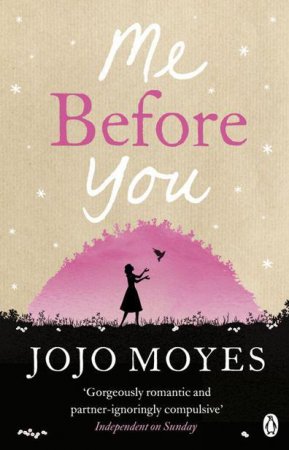 Me Before You
Me Before You After You
After You The Last Letter From Your Lover
The Last Letter From Your Lover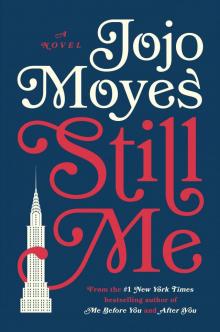 Still Me
Still Me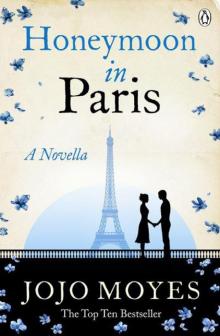 Honeymoon in Paris
Honeymoon in Paris Night Music
Night Music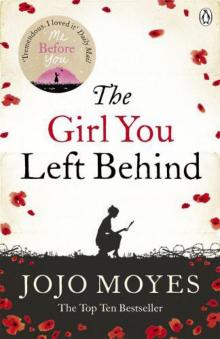 The Girl You Left Behind
The Girl You Left Behind Windfallen
Windfallen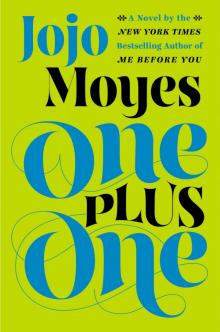 One Plus One
One Plus One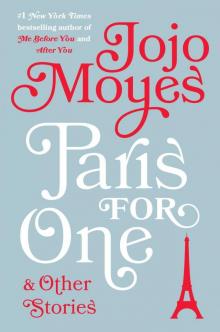 Paris for One and Other Stories
Paris for One and Other Stories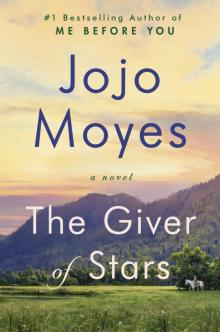 The Giver of Stars
The Giver of Stars The Ship of Brides
The Ship of Brides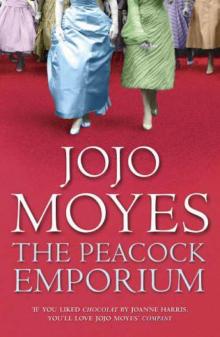 The Peacock Emporium
The Peacock Emporium Silver Bay
Silver Bay The Horse Dancer
The Horse Dancer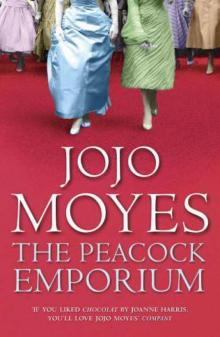 Peacock Emporium
Peacock Emporium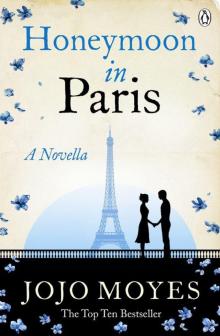 Honeymoon in Paris: A Novella
Honeymoon in Paris: A Novella Ship of Brides
Ship of Brides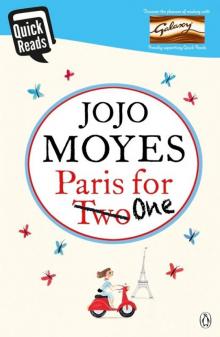 Paris For One (Quick Reads)
Paris For One (Quick Reads)